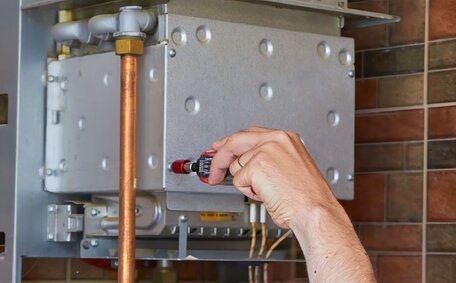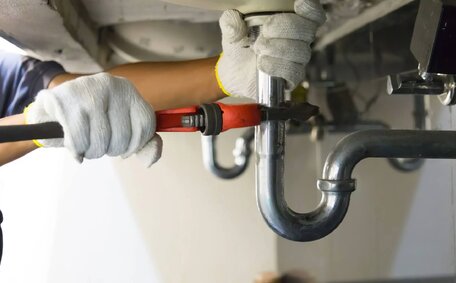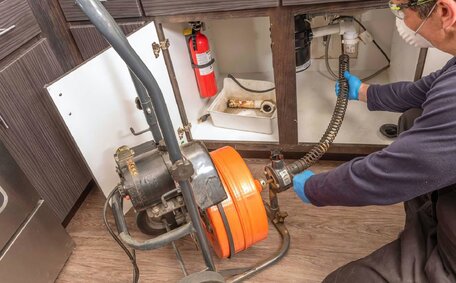Introduction to Common Causes of Blocked Drains
With over ten years of plumbing experience in Dulwich Hill, we’re well-versed in the frustrations of dealing with a blocked drain. Foul odours and backed-up water are clear signs of a significant drainage problem.
In this comprehensive guide, we’ll outline the most common causes behind blocked drains so you can avoid issues or identify the cause if you’re currently facing a plumbing emergency. We’ll go through everything, including early signs, from hair and soap scum to main issues like invasive tree roots and structural problems.
Read on for prevention tips and early identification strategies that can prevent clogs. Knowing how to tackle blocked drains can help you resolve issues quickly, restoring proper water flow before damage sets in.
Grease and Fat Buildup
Oil, grease, and certain soaps often cause pipe blockages by hardening in the pipes. As grease cools in the pipes, it solidifies and adheres to pipe walls, causing restricted water flow. This common accumulation constricts the pipes over time.
The best preventive measure against blocked pipes from grease is to discard oily substances in the bin, not down the drain. Similarly, coffee grounds along with excess fat and food remnants should be scrapped into the bin rather than rinsed down the sink to forestall clogs in your kitchen sink.
Gurgling noises, foul odours, and slow drainage are indicative of a grease-related blockage. Unfortunately, the best way to fully address a heavy grease clogged drain is by disassembling pipes through drain snaking or hydro jetting.
Hair Accumulation
Hair that finds its way into drains is a stubborn clog initiator, often entangling with soap and solidified grease to create blockages. This creates dense mats that block water flow, which commercial de-clogging agents might help resolve.
To ensure hair isn’t flushed down your drains, always employ sink drain catchers and hair traps throughout your household, intercepting stray strands before they can compromise your pipes. Disposing of hair clumps in the trash rather than letting them enter drains prevents potential clogs. For existing hair clogs, a robust drain cleaner or a drain snake may be necessary to extricate the tangled mass.
Signs of a hair-related blockage include slow drainage without odours. The clog may also make a light swishing or sweeping sound as water passes through the hair mass. A camera inspection can determine whether hair is the cause of the blockage.
Foreign Objects Flushing
Introducing items other than waste and toilet paper into the toilet may contribute to compacted dirt risks, as drains can become clogged with these unwelcome contributions. Products marketed as 'flushable,' such as wipes, paper towels, tissues, cotton swabs, and sanitary items, can accumulate inside drains, leading to significant blockages.
To prevent flushing issues, use only toilet paper and avoid discarding anything else in the toilet, choosing septic-safe, fast-dissolving varieties. Keeping trash bins in bathrooms helps discourage the flushing of non-flushable items. Provide guidance to all household members, especially youngsters, on what should never be flushed down the toilet.
Telltale signs your toilet is blocked by a foreign object include weak flushes, gurgling sounds, foul sewage smells, and water overflowing. While a drain snake can sometimes hook and pull out the obstruction, removal often requires extensive plumbing work.
Tree Roots and Outdoor Debris
Tree roots are a major cause of drainage blockages. As trees come of age, roots delving deep in search of moisture can infiltrate pipes and cause blockage. Roots commonly infiltrate drainage pipes through cracks or loose joints.
Roots that infiltrate plumbing systems can expand and cause considerable damage to drain pipes. This creates a significant plumbing problem, which can result in pipes cracking and joint seals failing. Additionally, once inside your drainage system, roots can along with debris swiftly journey down, impeding water flow.
To prevent clogs in the first place, ensure trees are planted at safe distances from any underground pipes on your property when planning your landscaping. Choose varieties with less aggressive root systems and routinely apply root inhibitors around pipe networks.
Irregularities like sluggish drainage, unwelcome sewage backflows, and soggy patches of soil can signal unwanted growth coming your way. Invasive roots often necessitate comprehensive excavation to eliminate the blockage and repair plumbing damage. Address issues promptly and call professional help if needed before pipes are completely overrun.
Pipe Installation Issues
Faulty installation or infrastructure issues often result in recurring clogged pipes. Cracks, misaligned pipes, weaknesses in joints or seals, and other defects provide easy access for roots, debris, and moisture – all common cause of blockage culprits.
On a local note from Dulwich Hill, we recommend scheduling a professional inspection of your drainage system. Unearthing common causes blocked early can curb potential headaches down the road. We can assess your pipes for improper slopes, damage, material failures, and installation errors.
Understanding various issues enables plumbers to manage blockages effectively, potentially advising on repiping or realignment of your plumbing. We also frequently install root guards, seal joints with epoxy, and reinforce access points. Proactive maintenance of your drainage can minimise future problems and costly emergency repairs.
Mineral Deposit Buildup
Minerals from hard water, like magnesium and silica, build up and commonly block drains. These mineral deposits gradually build up, narrowing the pipes, which restricts water flow and causes clogged pipes.
Areas with hard water require special treatment like water softeners to reduce mineral levels. For existing buildup, professional hydro jetting services can scour drains that can be affected by mineral deposits to restore flow.
Signs that mineral deposits cause blocked pipes include reduced water pressure, rust stains, and stubborn flaky residue on faucet aerator screens. When left unchecked for too long, pipes may become thoroughly obstructed, necessitating complete replacement.
Preventing Future Blocked Drains
The best defence is proactive maintenance and prevention measures, ensuring all your drains get proper attention before clogs have a chance to develop.
Monthly, pour a mix of baking soda and vinegar down your drains, followed by hot water, to dissolve grease and maintain clear pipes. Use drain catchers in sinks and your bath to trap hair before it can clog your pipes. Also, discourage flushing anything aside from waste and toilet paper, as improper items might clog your plumbing’s intricate workings.
When enhancing your garden, leave a generous buffer between trees and the outside drain infrastructure to avoid unwanted interactions. Choose plants with less aggressive root systems as an extra safeguard.
Have a professional plumber inspect your drainage system annually to check for cracks or pipe defects. Catching minor issues early prevents major disasters down the road. Repairs and maintenance keep things flowing smoothly for years to come.
Identifying Signs of Blocked Drains
Detecting drain blockages swiftly is crucial to minimise damage and to do unblock them efficiently. Here are signs to look out for, along with tips on how to fix blocked drains:
- Sinks, tubs, or toilets draining slowly, which can often cause blocked drains
- Gurgling sounds from pipes when water drains
- Bad sewage odours, especially from floor drains
- Water pooling around floor drains
- Toilets that fail to fully flush waste
- Leaking pipes or wet patches above ceilings
- Basement flooding
- Low water pressure
- Rust coloured staining around drains or fixtures
- Flaky mineral deposits around taps or faucets
- Backed up sewer lines causing waste to flow up through other drains when in use
Concerning minor clogs, one might ponder drains how unblock them effectively; typically, this involves using drain cleaning agents, hot water, plungers, or other tools. However, for more severe, extensive blockages, how fix the problem becomes clear: professional services are required to unblock the drains and fully clear obstructions.
Engage a professional plumber promptly when puzzling over 'why my drain isn’t functioning correctly’ due to suspicions of a severe blockage. Severe clogs can quickly escalate from nuisance to emergency flooding or sewage backflows causing property damage or health hazards if severe drain backups occur.
Using At-Home Remedies
When facing minor drain blockages, you can use at-home remedies to help clear obstructions before they become severe issues requiring professional assistance. However, even boiling water may not fully solve stubborn clogs.
For upkeep, grappling with potential clogs can be tough, but a regular solution of baking soda and vinegar poured down the drain can help scrub away grease that’s built up can even prevent blockages. Plungers, plumber’s snakes, and improvised hooks paired with hot water can help clear minor debris blockages.
Yet, to address problem areas with severe blockages such as dense hair, mineral build-ups, root intrusions, or foreign items, such drain situations typically require high-pressure jet flushing, pipe repairs, or total replacements undertaken by a professional plumber. Severe backups risk flooding, contamination, and pipe damage if not promptly addressed.
Evaluate the severity of the blockage before trying to fix it yourself. Call a pro immediately if you suspect major pipe damage or sewage overflows. Focus on safely restoring drainage to avoid the risks associated with hazardous spills or infrastructure failure.
Hiring a Professional Plumber
When facing extensive, recurring, or hazardous drain blockages, the safest solution is calling a professional plumber for prompt service. Our Dulwich Hill Plumbing team brings over a decade of expertise in addressing drainage issues and ensuring proper flow.
We equip property owners with state-of-the-art diagnostics, and a skilled plumber can use drain cameras to locate any hidden culprits clogging your pipes. High-pressure hydro jetting then scours away years of buildup for fresh starts. We also repair leaks, replace worn pipes, reinforce sewer line infrastructure, and take preventative measures against future problems.
Avoid the risk of property flooding, contamination, or burst pipes by not attempting DIY drain repairs.For emergency assistance or appointments, residents across Dulwich Hill can contact Dulwich Hill Plumbing at 1300 349 338 or [email protected].
Available 24/7, we quickly restore safety and proper flow, ensuring you can flush and wash without hassle.






